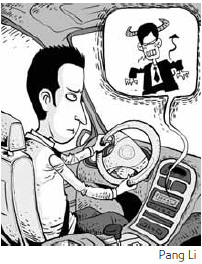During the latter years of my stay in the United States, I was a keen listener to National Public Radio (NPR).
It shocked me when commentators blithely lectured on China after living in Beijing or Shanghai for a couple of years. So I gradually weaned myself off NPR.

Yet there is only so much dance music one can listen to on commercial radio. A few days ago I found myself searching for NPR again, while in a rented car in San Francisco. Not surprisingly, I heard a long interview from a Chinese-American writer who had lived in Beijing and in Dharamsala, India, for years and had just published a book.
The writer traded jokes and anecdotes with the interviewer. Because she was Han Chinese, she said, she could speak candidly about them. Chinese are "rude", "cynical" and "jaded", she opined. China is an "autocratic" state and people can be thrown in jail on a whim, she added.
She even gave a personal example. She was riding her bike one day in China when "police" stopped her and wanted to arrest her. She said she could speak passable Chinese but couldn't understand what the officer was yelling about. A crowd of onlookers soon gathered.
Tibetans on the other hand, she described enthusiastically, as warm, kind and welcoming - the antithesis of the Han people.
The interview annoyed me as much as when I read the first couple of chapters from a bestseller written by a Chinese writer who had never lived overseas and criticized American culture from the viewpoint of Hollywood films.
Some Chinese may be rude and cynical but the Chinese-American writer's intellectual sloppiness in making sweeping generalizations made my head spin. How many Chinese does she know, considering her barely passable Chinese? Beijing has 17 million people and it is easy to spot rude acts committed by a few people in jammed buses and shopping malls. But to draw the conclusion that 1.3 billion Chinese are rude is stretching it.
The Chinese-American writer's supposed near-arrest was likely just a chengguan, urban administrative staff hired by the municipal government warning her about going the wrong way, not a police officer.

There are persistent stereotypes about China and the Chinese that seem to have become acceptable in mainstream America's media. Liberals and conservatives alike see the world in terms of black and white - good versus evil, China versus Tibet. China is portrayed as materialistic, totalitarian and repressed, while Tibet is a peace loving Shangri-la.
First of all, Tibet is part of China. Second, the issue is much more complicated than is generally portrayed.
The language issue is partly responsible for these misunderstandings. How many expats living in Beijing, Shanghai and Tibet can truly converse with locals and share the intimate details of their lives? Other times, old stereotypes may be too convenient for us to abandon, as realities are sometimes too complex to summarize.
Sidney Rittenberg, an American who suffered with the birth of New China and experienced solitary confinement while being imprisoned for 16 years, recently returned to China. At one of his speeches in Beijing, he spoke about what he likes and dislikes about China, the challenges China faces and his confidence that China will emerge strong through all these challenges.
Though Rittenberg experienced jail in China he has discarded old stereotypes. If only others could see the whole picture as clearly.
|
|
|
|
|
|
|
|
